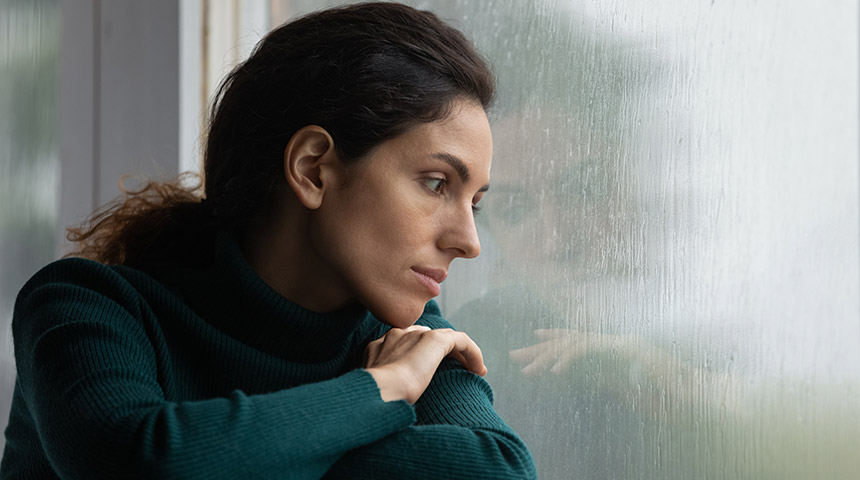If you’ve lost someone you love, you’re intimately familiar with grief. A natural response to loss, grief is deeply personal, but it’s a universal experience we all face.
When people think about how they’d like their last moments in life to be, they often envision being surrounded by their loved ones, celebrating the connections they’ve built over a lifetime.
Unfortunately, the COVID-19 pandemic has upended our ability to find the peace many of us hope to have following the passing of a loved one. Hospitals, nursing homes and care facilities limit the number of visitors, restricting our ability to say goodbye.
Traditional mourning periods, funeral services and burials also have been significantly altered to avoid large group gatherings. This has changed the way we grieve, leading many people to feel intensely alone during a time when they need others more than ever.
Signs of Grief
Decades ago, psychiatrist Elisabeth Kübler-Ross developed the “five stages of grief” — denial, anger, bargaining, depression and acceptance. While originally meant to demonstrate the stages of grief a person diagnosed with a terminal illness goes through, the five stages were co-opted and widely believed to be experienced by those who have lost a loved one.
Today, we know there is no timeline on grief and no predictable path for the progression of emotions that come with losing a loved one. Common signs of grief include:
● Bitterness
● Change in appetite
● Detachment
● Difficulty making decisions
● Fatigue
● Guilt
● Loss of focus
● Moodiness
● Preoccupation with loss
● Trouble sleeping
Our grieving process can be affected by several factors, including who we lost and our relationship to them, the manner of their death and how we naturally handle our own emotions.
What Is Complicated Grief?
Some individuals experience “complicated grief.” An estimated 10 percent to 15 percent of bereaved people may feel debilitated by their grief, even after time has passed. Signs of complicated grief include:
● Depression, guilt and self-blame
● Intense, long-lasting pain and sorrow over the loss
● Isolation from family, friends and community
● Feeling like life has no purpose or isn’t worth living
● Focusing intensely on the loved one’s death
● Struggling to carry on with life
● Trouble accepting the death
If your grief and emotional pain persist, it may be time to consider making an appointment with a mental health professional.
Trying To Find Peace
Most cultures have developed memorial and burial customs that help the living accept and find closure in the loss of a family member or loved one.
Due to the pandemic, many grieving people are unable to attend funerals, memorial services and celebrations of life. Video conferencing has allowed us to stream some memorial services, for example, but it may not feel “real” if you can’t grieve in person.
The key to beginning the healing process when you can’t grieve in traditional ways is to find your own way to mourn, celebrate your loved one’s life and bid them farewell. There are many ways to do this. Some examples include:
-
Creating a physical memorial in a special place, such as in your garden or near your home’s entryway
-
Spending time enjoying and communicating memories
-
Holding your own private ceremony to say goodbye
More Ways To Heal
Taking care of yourself can help you get through this difficult time and come to terms with your loss. Some additional ways to process and heal from grief and loss include:
Face your feelings. Though you may want to suppress your grief, you can’t avoid it long-term. It’s important to acknowledge your pain so you don’t prolong the grieving process. As the saying goes, “wherever you go, there you are.”
Look after your physical health. Eating nutritious foods, exercising and getting enough sleep can help you feel strong enough to cope and move through your grief.
Spend time with others. Though you may be tempted to isolate yourself, spending time with friends and family can provide comfort.
Return to your hobbies. Getting back to the things that you enjoy can help you find comfort and happiness.
Express your feelings. If you’d rather not talk about your loss with others, it may help to write in a journal or create art that helps you release your emotions.
Join a support group. There are local and virtual grief support groups available. It can help to connect with others who are also grieving and sharing similar feelings.
When To Ask for Help with Grief
If your grief is overwhelming and you feel like you can’t move on, consider finding a mental health professional who has experience in grief counseling. A therapist can help you work through your emotions and find a way to move forward.
Contact your doctor or therapist if you have intense grief that affects your ability to engage in day-to-day activities or if you are having suicidal thoughts.









